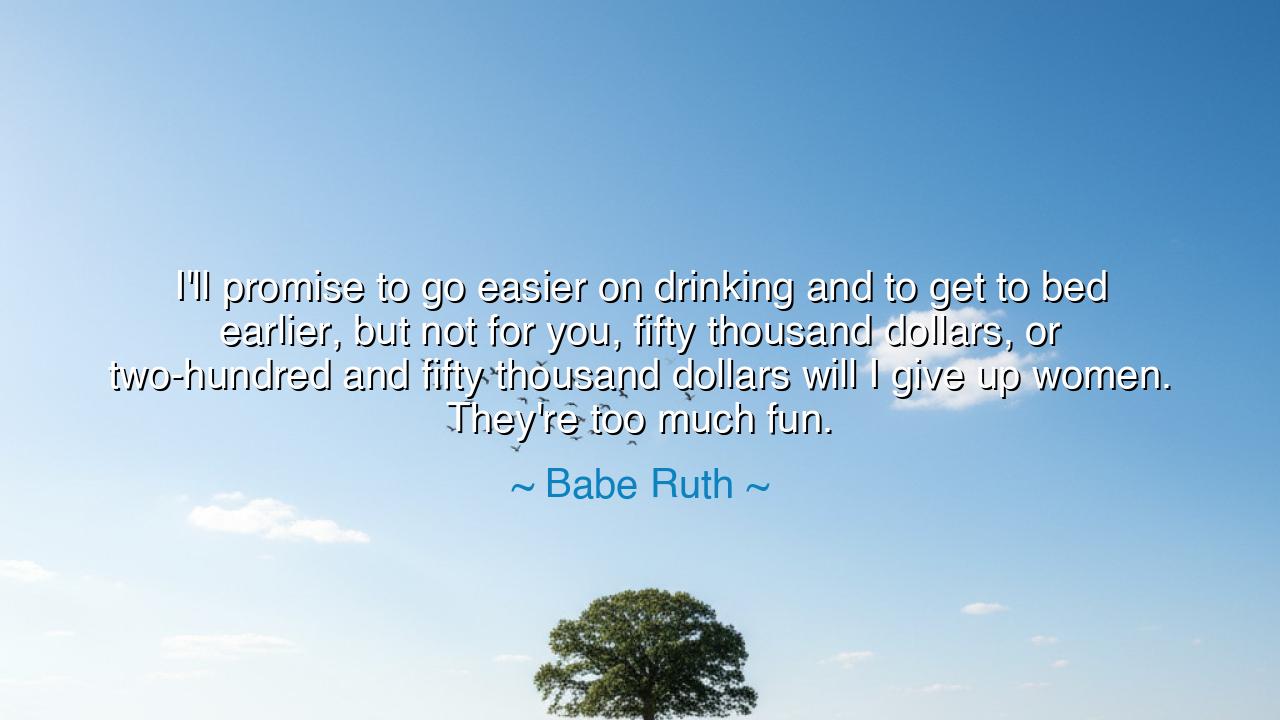
I'll promise to go easier on drinking and to get to bed earlier
I'll promise to go easier on drinking and to get to bed earlier, but not for you, fifty thousand dollars, or two-hundred and fifty thousand dollars will I give up women. They're too much fun.






The words of Babe Ruth, “I’ll promise to go easier on drinking and to get to bed earlier, but not for you, fifty thousand dollars, or two-hundred and fifty thousand dollars will I give up women. They’re too much fun,” ring with the voice of a man larger than life, unashamed of his appetites and unwilling to bind his spirit for gold. In them we hear not only the boast of a ballplayer, but the eternal tension between discipline and desire, between the demands of society and the wild call of freedom.
In the ancient spirit, such words might have been spoken by a warrior who refuses to renounce wine or love, even at the command of a king. For what Ruth declares is that money, though mighty, cannot purchase joy. To him, the pleasures of companionship, of laughter, of passion, are treasures greater than the weight of gold. He lived not by the rules of moderation, but by the creed of vitality, where the fullness of life was worth more than any purse.
Consider Ruth’s own story: born into hardship, raised in an orphanage, he rose to become the most celebrated figure in baseball. Yet even as he shattered records and filled stadiums, he remained devoted to indulgence, to drinking, feasting, and chasing pleasures. His managers scolded him, his critics condemned him, but he refused to surrender what he saw as life’s true delights. For Ruth, greatness on the field was not separate from excess off the field—it was all part of living with abandon.
History remembers others who spoke in kind. Diogenes the Cynic, though poor, mocked those who sacrificed freedom for wealth, choosing instead to live by desire, however scandalous it seemed. Babe Ruth, in his own age, was a modern Diogenes with a bat in his hands—mocking restraint, thumbing his nose at convention, and insisting that joy was greater than reputation or riches.
So let this teaching endure: wealth may buy houses and titles, but it cannot buy the fire of the human spirit. To live is more than to earn; it is to taste, to love, to revel in the fleeting gifts of life. Ruth’s words are not a call to recklessness alone, but a reminder that joy must never be sold cheaply, not even for riches. For in the end, the man who laughed and lived fully will be remembered more than the miser who kept every rule.






VTPham Van Vi Tai
There’s no denying that Babe Ruth was an iconic figure in sports, but this quote raises issues around objectification and respect toward women. While Ruth’s candidness might have been seen as part of his charm, should we celebrate such an outlook in today’s world? What would it mean for modern role models to embrace both their achievements and a more respectful, egalitarian view of women?
TNthiin nguyen
Babe Ruth’s quote reflects the indulgent, often reckless behaviors of his time, especially in the context of fame and masculinity. But how should we interpret his words today? Is it possible to admire his talent and achievements while acknowledging that his view of women was flawed? Should we overlook or critique such statements from historical figures, or is it important to address these aspects as part of their legacies?
TVThuy tien vu
While Babe Ruth’s quote is certainly iconic and speaks to his larger-than-life persona, there’s something problematic about how he views women. Reducing relationships to ‘fun’ and claiming that money won’t change his mind about them speaks to an outdated, transactional view of women. Can we appreciate Ruth’s athletic achievements while also critiquing his behavior and views on women? How do we reconcile these two aspects of his legacy?
MQDoan Minh Quan
There’s an interesting mix of confidence and irresponsibility in Babe Ruth’s quote. On one hand, it’s a window into the lavish, self-indulgent lifestyle of a sports icon, but on the other, it perpetuates the idea that women are disposable fun, not worthy of deeper respect. Does this attitude still linger in modern pop culture, and if so, how should we address it when it’s celebrated as part of someone's legacy?
HAPham Le Ha An
Ruth’s statement, while undoubtedly a reflection of his larger-than-life persona, can feel dismissive toward women, reducing them to mere distractions or 'fun.' How much of this view is simply a product of the time he lived in, and how much of it continues to persist in modern celebrity culture? Should we continue to romanticize the behaviors of people like Ruth, or should we challenge these outdated perceptions?